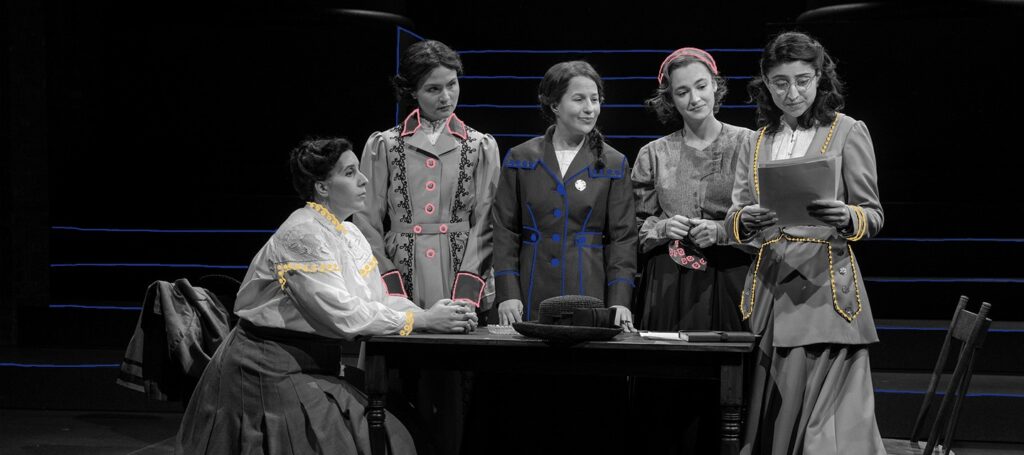


While Looking at History “Suffs” Elects Didacticism Over Adventurousness
Shaina Taub has spent eight years researching and condensing the adventures of women’s rights activist Alice Paul and her cronies into a manageable tale. Despite the comparatively concise final product, at nearly three hours in runtime, Suffs (shorthand for women who fought to win the right to vote) still feels too long to absorb in one sitting.
Though well crafted by Taub―who wrote the book, music, and lyrics―beautifully performed by the cast of 19 women and non-binary actors, and neatly directed by Leigh Silverman, the show could stand to jettison approximately 30 minutes of its repetitive slogans, anthems, chants, and “this is who I am” songs. What starts out as rousingly enchanting, soon causes one’s eyes to glaze over as a quality of sameness begins to set in.
To her credit, Taub really knows her characters and their backstories. I’m just not certain she’s figured out how to make them feel like scintillating portraits instead of walking book reports. That might be design.
Though it also premiered at the Public Theater and follows a popularly unknown historical figure, Suffs isn’t Hamilton. Far from developing a cult of personality around her leading character, as Lin-Manuel Miranda did with his, and more than entertaining the crowds, it’s clear that Taub wants audiences to internalize every aspect of what it took to pass the 19th Amendment―even if that means sacrificing character development.
Suffs begins with a vaudevillian introduction, à la A Funny Thing Happened On the Way to the Forum’s “Comedy Tonight.” From there, we jump to a National American Woman Suffrage Association (NAWSA) meeting led by Carrie Catt (Jenn Colella), who believes that the way to secure the right for women to vote is through decorum.
Alice Paul departs this meeting with her own radical agenda: launching the 1913 Woman Suffrage Procession in Washington to rouse attention. After sneakily securing a base of operations, she assembles a posse of like-minded women to help achieve her goals.
Paul is keenly aware of her coterie’s strengths and deploys them with maximum efficiency. In this regard, they resemble the eponymous characters of Bertol Brecht’s Mother Courage and Her Children, with Paul as the brave one and always ready with a new scheme, no matter how potentially ruinous.
Their success brings them to the attention of Catt and Woodrow Wilson, both of whom express admiration but evolve into opposing forces. From there, the musical moves forward with an eye on the brutal consequences of Paul’s unwavering commitment to her cause. This includes working friends unto exhaustion & insisting that they suffer through torture alongside her to gain public approval. Ultimately, they win, but the victory feels hollow when one realizes that after all this time we are no closer to learning who Paul was.
In real life, Paul was an intensely private person and left behind almost no personal correspondence. Rather than create an engaging inner life for her fictional version, Taub allows the character to hide behind the veil of, “nothing matters more than the movement.” Indeed, during a tête-à-tête with her best friend and campaign spokeswoman Inez Milholland (Phillipa Soo, delivering glamorous wit), Park reveals how little she knows about her friend’s life. Muholland responds: “How could you know? You barely take an interest outside of the work.”
We learn that her gotta-keep-working persona was borne out of Paul’s having to “be the strong one” after her father’s death. Rather than break through that wall, Taub allows it to create a dam of emotional constipation that all but consumes the show. Surprisingly, Taub hijacks and grounds the show with the charismatic leader it needs: the Black rights activist Ida B. Wells (Tony Award winner Nikki M. James, powerful, poised, and with a ferocious belt that doesn’t fear risking tenderness).
James electrifies proceedings by confronting Paul & Co with their desire for her support as a woman and their refusal to stand for her rights as a Black person. With this moment, Taub acknowledges the sins of white feminism as they existed in the suffrage movement. Unfortunately, this is Paul’s story and her singular fervor for winning the vote even if it means consorting with racists―much like her foremothers Elizabeth Cady Stanton and Susan B. Anthony―soon reclaims command.
But imagine if Taub had abandoned revealing things any audience member could have looked up, and presented us with the unknown; who Alice Paul was other than a relentlessly persuasive though non-charismatic leader with dynamic friends, and what she might have accomplished by teaming with Ida B. Wells.
In giving Wells the show’s theme and strongest composition―“Wait My Turn”―Taub shows that she sympathizes with what Black women have been asked to repeatedly suffer, but fails to meaningfully engage with that implication until Suffs’ final ten minutes when the theory of intersectionality is finally embraced. This comes after the passage of the 19th amendment, with the show suddenly jumping forward about 50 years.
Paul finally realizes that much like her now-deceased former rival, Carrie Catt, the fight for liberation will not end with her―indeed, as the repetitive final song “Never Over” tells us, “Failure is inevitable.” After feeding audiences over two and a half hours of white feminism, that sentiment feels insufficient, especially when James’ version of Wells shows us what might have been.
It is uncharitable to gripe about Taub’s efforts when one can see that she has successfully accomplished all that she set out to do. But with these didactic results―which felt more interested in securing my agreement by burying me in factoids than in arousing my curiosity―I came away wanting more.
Contrary to my reaction, the audience at the performance I attended seemed to love every aspect of Suffs. Perhaps its interpretation of white feminism is simply too much for me to appreciate.
Keep Reading

In ‘Take Me Out’ White Agency and Ableism Have a Ball
Imagine a world where a superstar baseball player on par with Derek Jeter decides to disclose that he is gay. In 2003, Richard Greenberg did precisely that with Take Me Out and received the Tony Award for Best Play for his regressive efforts. Almost two decades later, his ableist and gay-caricature-laden affair has returned to […]
Read More
‘Paradise Square’ Packs Valuable Lessons in Old-Fashioned, Familiar Wrapping
Ensembles of Black and immigrant communities sing about the difficulties of living in a changing America. A group of people stand in a triangle formation and protest. Black and white people compete against each other in a racially and politically charged dance contest. No this isn’t Ragtime, Les Mis, or Hairspray. It’s Paradise Square, a […]
Read More












